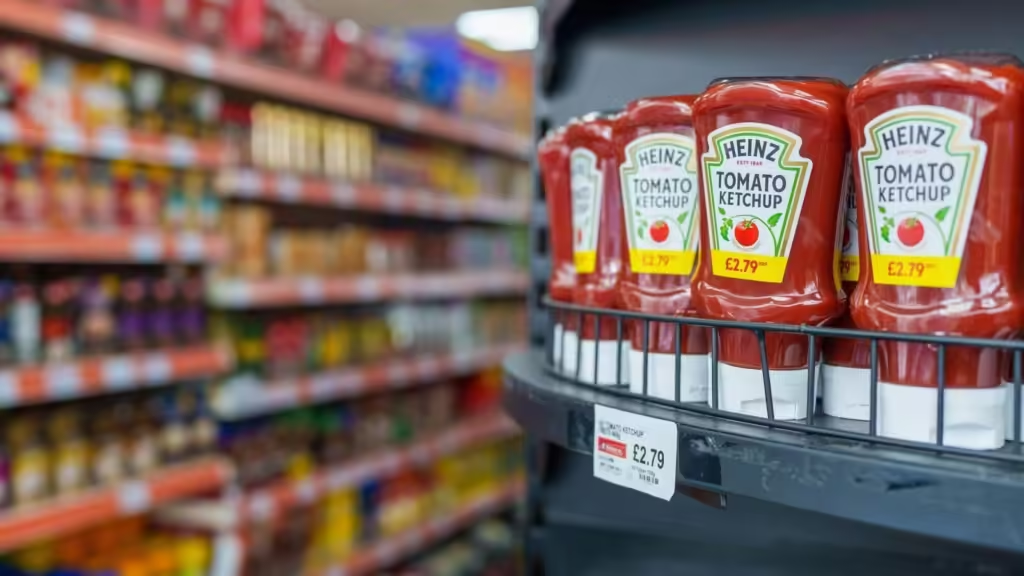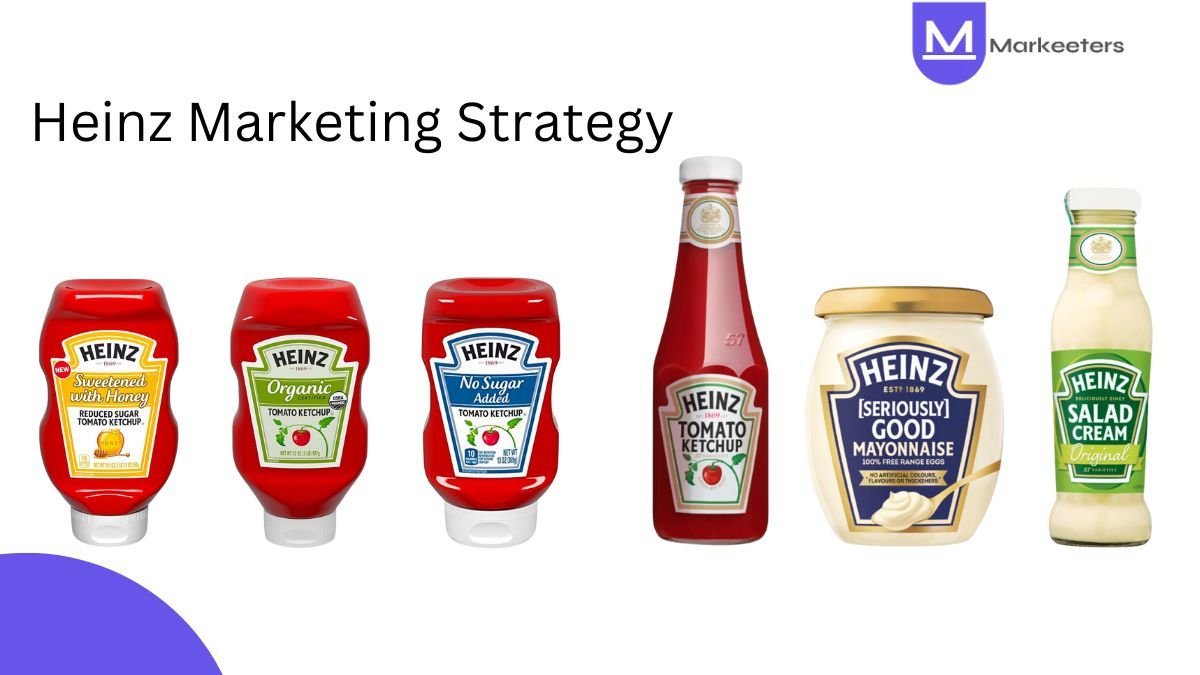In a world of fleeting trends and fickle consumers, one brand has managed to stick around longer than that forgotten bottle of ketchup in the back of your fridge. Heinz has been painting the town red for over 150 years. But how exactly does a company selling what’s essentially crushed tomatoes in a bottle maintain its grip on the global palate?
Welcome to the secret sauce of Heinz’s marketing strategy – a recipe more closely guarded than the nuclear codes, yet more impactful than a ketchup stain on a white shirt. By the end of this blog post, you’ll understand why Heinz isn’t just selling condiments – they’re bottling a lifestyle, a memory, and a little bit of magic. Let’s uncap the secrets of Heinz’s marketing strategy and see what spills out.
Who’s Buying Heinz?
Understanding Heinz’s target audience is important to understand its marketing strategy. While the brand has broad appeal, it focuses on several key demographic groups:
1. Families with children
Heinz products, especially ketchup, are staples in many family households. Parents appreciate the brand’s reliability and familiarity, while children are drawn to the fun packaging and kid-friendly flavors.
2. Millennials and Gen Z
These younger consumers value convenience, authenticity, and sustainability. Heinz has adapted its marketing to appeal to these generations through social media engagement, innovative product launches, and eco-friendly initiatives.
3. Health-conscious consumers
As health trends have evolved, Heinz has expanded its product line to include organic, low-sugar, and reduced-sodium options, targeting consumers who want healthier alternatives without sacrificing taste.
4. Foodservice industry
Restaurants, cafeterias, and other food service providers are a significant part of Heinz’s B2B target audience. The brand’s consistency and quality make it a favorite among chefs and food service managers.
5. International markets
Heinz has a strong global presence and it adapts its products and marketing to suit local tastes and preferences in various countries. By tailoring its marketing strategy to these diverse audience segments, Heinz ensures broad appeal while still maintaining a cohesive brand identity.
Unpacking Heinz’s Marketing Mix
To understand Heinz’s marketing strategy fully, we need to examine its marketing mix, often referred to as the 4 Ps: Product, Price, Place, and Promotion.
1. Product

Heinz’s product lineup extends far beyond its iconic ketchup. The company offers a wide range of condiments, sauces, and convenience foods. Heinz regularly introduces new flavors and product variations to keep consumers engaged and maintains strict quality control to ensure its products meet consumer expectations.
From squeezable bottles to single-serve packets, Heinz constantly improves its packaging for convenience and differentiation.
2. Price
Heinz employs a premium pricing strategy, positioning itself as a high-quality brand worth paying extra for. The brand emphasizes the quality and heritage of its products to justify higher prices.
It also offers occasional discounts and promotions to attract price-sensitive consumers that drive sales volume.
3. Place

Distribution is an important component of Heinz’s marketing strategy. The company ensures its products are widely available through retail partnerships, e-commerce presence, and global distribution.
4. Promotion
Heinz uses a multi-channel approach to promote its products and maintain brand awareness. This may include:
- Traditional advertising: TV commercials, print ads, and billboards continue to play a role in Heinz’s marketing mix.
- Digital marketing: Increasing focus on social media, content marketing, and influencer partnerships.
- Public relations: This involves using the brand’s heritage and corporate social responsibility initiatives to generate positive press.
By carefully balancing these elements of the marketing mix, Heinz maintains its strong market position and adapts to changing consumer preferences.
Secret Sauce of Heinz’s Marketing Strategy
Heinz’s marketing strategy goes beyond traditional approaches. Heinz incorporates innovative tactics to keep the brand relevant and engaging. Here are some standout strategies:
1. Nostalgia marketing
Heinz uses its long history and cultural significance to evoke positive emotions in consumers. It uses retro packaging i.e. it releases limited editions featuring vintage label designs, and conducts heritage-focused campaigns to highlight the brand’s longevity and consistent quality. It also encourages consumers to recreate classic dishes using Heinz products.
2. Social media engagement
Heinz has embraced social platforms to connect with younger audiences and drive brand conversation. It is done through the following activities:
- User-generated content: It involves encouraging fans to share their Heinz experiences and creations.
- Viral challenges: Heinz creates shareable content and hashtag campaigns to boost engagement.
- Real-time marketing: Heinz ensures quick responses to trending topics and events with clever, brand-relevant content.
3. Consumer-Oriented
Recognizing consumers’ desire for unique experiences, Heinz has introduced personalized elements to its marketing.
- Custom label promotions: This allows consumers to order ketchup bottles with personalized labels.
- Regional flavor variants: Heinz develops products tailored to local tastes in different markets.
- Personalized recipe recommendations: Heinz uses data to suggest recipes based on consumer preferences.
4. Sustainability initiatives
As part of Heinz’s marketing strategy, the company has emphasized its commitment to environmental responsibility. It has introduced recyclable and plant-based packaging options. Heinz also highlights efforts to source ingredients responsibly and organizes zero-waste campaigns to educate consumers on reducing food waste and recycling Heinz packaging.
5. Collaborations and partnerships
Heinz has partnered with other brands, celebrities, and influencers to extend its reach and create buzz. It includes:
- Co-branded Products: Heinz collaborates with complementary brands to create unique offerings.
- Celebrity Endorsements: Heinz partners up with popular figures to appeal to specific demographics.
- Influencer Marketing: Heinz uses social media personalities to showcase Heinz products in authentic ways.
6. Experiential marketing
Creating memorable brand experiences has become a key part of Heinz’s marketing strategy. This involves:
- Pop-up Restaurants: This strategy involves the opening of temporary Heinz-themed eateries to generate excitement and media coverage.
- Interactive Installations: This involves creating engaging public displays that encourage social sharing.
- Virtual Reality Experiences: Virtual reality experience involves developing immersive digital experiences that showcase Heinz products and history.
7. Data-driven marketing
Heinz uses consumer data and analytics to make informed marketing decisions. It uses consumer insights to deliver more relevant ads across various platforms and analyses trends and consumer feedback to guide new product creation.
8. Cause-related marketing
Aligning the brand with social causes has become an important aspect of Heinz’s marketing strategy. Some initiatives include:
- Hunger relief initiatives: Supporting food banks and meal programs in communities worldwide.
- Education programs: Sponsoring nutrition education and culinary training initiatives.
- Disaster relief efforts: Providing food and resources in the wake of natural disasters.
Challenges and Future Directions
While Heinz’s marketing strategy has been largely successful, the brand faces ongoing challenges:
- Health concerns: As consumers become more health-conscious, Heinz must continue to innovate and offer healthier alternatives.
- Private label competition: Store brands increasingly threaten Heinz’s market share, requiring the company to emphasize its quality and heritage.
- Changing consumer preferences: Shifts in taste and dietary habits require Heinz to stay agile and responsive to market trends.
Looking ahead, Heinz’s marketing strategy is likely to focus on:
- Expanding plant-based offerings to cater to the growing vegetarian and vegan market.
- Investing in direct-to-consumer channels to build stronger relationships with customers.
- Leveraging artificial intelligence and machine learning for more personalized marketing and product development.
- Further emphasizing sustainability and corporate social responsibility to appeal to conscientious consumers.
Conclusion
And there you have it, folks – the secret sauce behind Heinz’s enduring success. From targeting families to millennials, and from nostalgic campaigns to cutting-edge digital strategies, Heinz has proven it’s not just a condiment, but a marketing condimaster.
So, the next time you’re struggling to market your own product, remember: you can always take a page out of Heinz’s marketing strategy playbook. Just be careful not to get too saucy with your marketing tactics – you don’t want to end up in a pickle. And remember, whether you’re selling ketchup or rocket ships, the key is to find that special blend of tradition and innovation that will keep your customers coming back for seconds.
How does Heinz use digital marketing?
Heinz uses social media platforms, influencer partnerships, and interactive online campaigns to engage consumers. They also use data analytics to personalize marketing efforts and optimize their digital advertising spend.
What role does sustainability play in Heinz’s marketing strategy?
Sustainability is increasingly important in Heinz’s marketing. They highlight their efforts in sustainable packaging, responsible sourcing, and reducing environmental impact to appeal to eco-conscious consumers
How does Heinz differentiate itself from competitors?
Heinz differentiates through product quality, iconic branding, and unique flavors. They also focus on creating emotional connections with consumers through nostalgia-driven campaigns and emphasizing their role in family traditions.
What strategies does Heinz use for global market expansion?
Heinz adapts its products and marketing to local tastes and cultures while maintaining core brand elements. They often enter new markets through partnerships or acquisitions of local brands, then gradually introduce Heinz-branded products.



